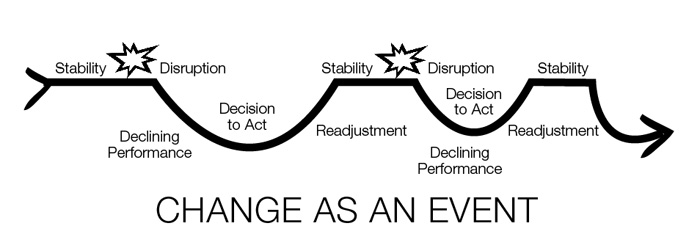To a great extent, our organizations, our lives, and our communities, are built on the notion of stability. We set goals as if they were ultimate destinations rather than mileposts on a journey. We ask our children (and ourselves) what they want to “do” when they grow up – as if there was one answer, or even an answer. We build organizations with a hierarchical structure that implies constancy and order. And we carry on – searching for that place where things quiet down, where we will “work out of it”, where if we “just get through this next few months”, it will get better. And it doesn’t.
Our view of the world looks like the diagram below: stability as the norm, punctuated by change. Change is seen as an event, a disruption, that while annoying or time consuming or scary, ultimately will pass. We want to believe that life will stabilize and things will “get back to normal”.

Of course even in the distant past, nothing truly was stable or unchanging. But since the pace of change was slower, we could hold on to the illusion that it was. There was a time when perhaps you could shuffle off to college, learn to be an accountant (or teacher or programmer or lawyer), land a job and toil away day by day for your entire career. There was a time when you could bring a product to market that had a long shelf life – measured in decades rather than months. Where you could incrementally tweak and improve and get better and better at making more of your product faster, better and cheaper.
As some level, I think every one of us knows that these old notions of stability are fiction. That the pace of change is breakneck, coming so fast and furious that we can’t assimilate and accommodate or make sense of it all. That the longevity of our position, our career, our company, our product, or our gadgets are measured at best in years, more likely in months and very seldom in decades. Love it or hate it – we need to reconcile that unrelenting change is the new normal.
If that is the case, our striving for stability is futile; an exercise in denial. It is a Don Quixote exercise in tilting at windmills.
We need to change our mental model and just admit that the world is in continual flux – and that includes just about all we touch: our careers, our communities, our social institutions, our economy and the world political environment.
And with that acknowledgement, recognize that in order to maintain some balance, some footing on uncertain ground, something to aim at, we need to shift our focus. Rather than the focus on stability, it needs to be something loftier, something outside us, something worth striving for. This focus is something that provides direction, organizes our efforts and is the core that both sustains and balances us.
Here is an example. With difficult balance poses in Yoga, one is taught to find a drishti
 – a focal point which one looks at to concentrate and at the same time achieve inner and outer balance. As you gaze upon this point, you find that your body intuitively makes small adjustments, and that your balance improves. When you focus on maintaining balance rather than the drishti, you over-correct and consequently experience that which you are trying to avoid. The focal point grounds you, allows you to concentrate, to relax a bit and to achieve balance.
– a focal point which one looks at to concentrate and at the same time achieve inner and outer balance. As you gaze upon this point, you find that your body intuitively makes small adjustments, and that your balance improves. When you focus on maintaining balance rather than the drishti, you over-correct and consequently experience that which you are trying to avoid. The focal point grounds you, allows you to concentrate, to relax a bit and to achieve balance.
Rather than striving for stability, we (as individuals, as organizations, as communities) would be better served to find our drishti – our focal point, our common goals, our inner values – and to continue to work toward them – making continual, intentional and more incremental shifts (continually changing) as we move toward that vision. We may go forward and then backward. We may be diverted and get a bit off track. But if we can maintain that focus on a vision, a higher goal, a shared purpose – we quickly get back on track – regaining that balance and momentum toward the goal.
In that case, our actions would like more like the diagram below, in which the focus is the goal, change is constant, and we move with agility toward that vision- not always in a straight line – but toward it nonetheless.






One Response
Your words about expecting change as part of the invigorating life cycle are an important reminder to me. Sometimes it is easy to say “If only this certain interruption/change hadn’t happened….” versus “This interruption is a part of ongoing life and resistance to it can impede healthy growth.” Thanks, Kris, for your articulate expression of transitions an change.
Comments are closed.